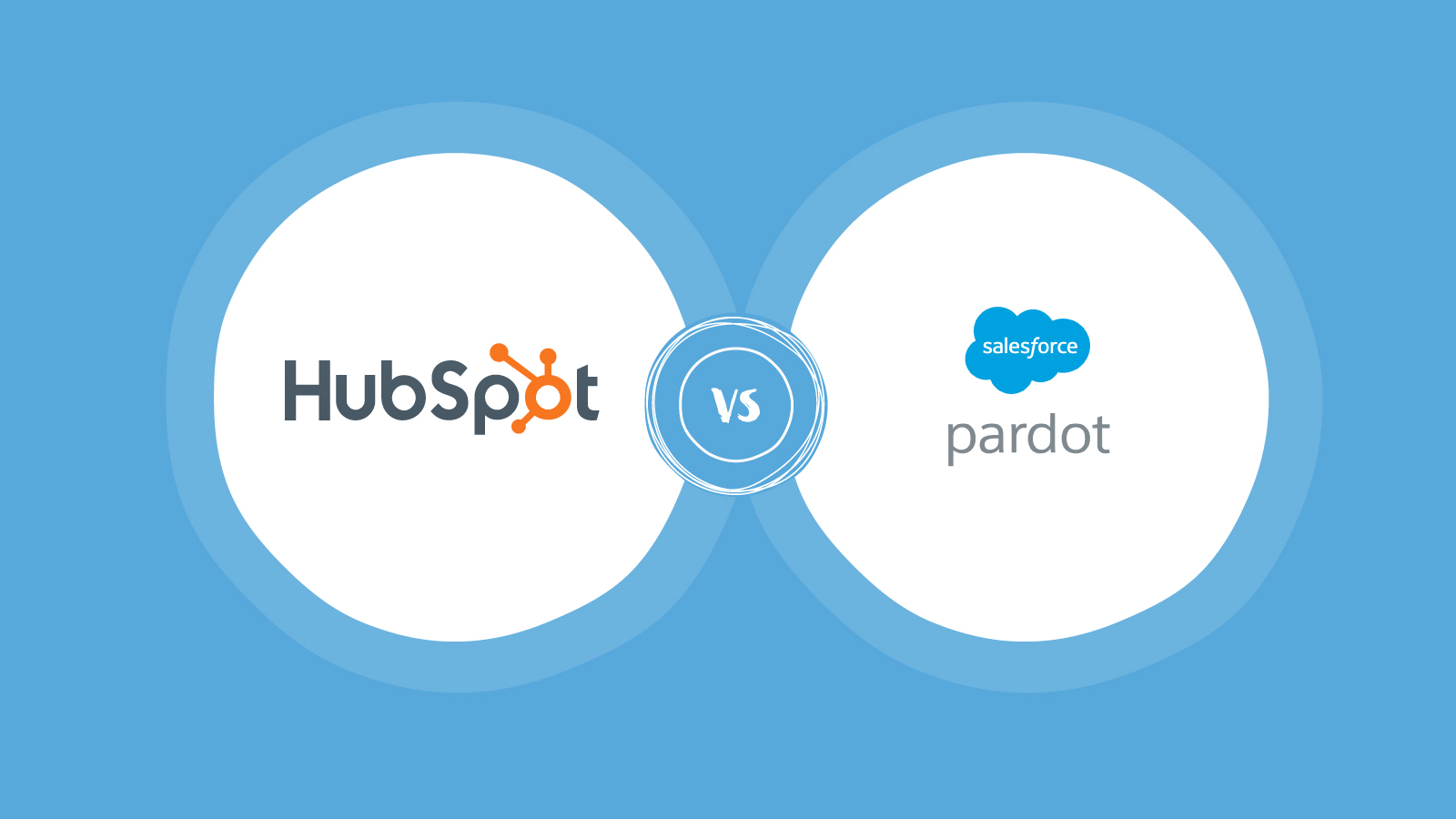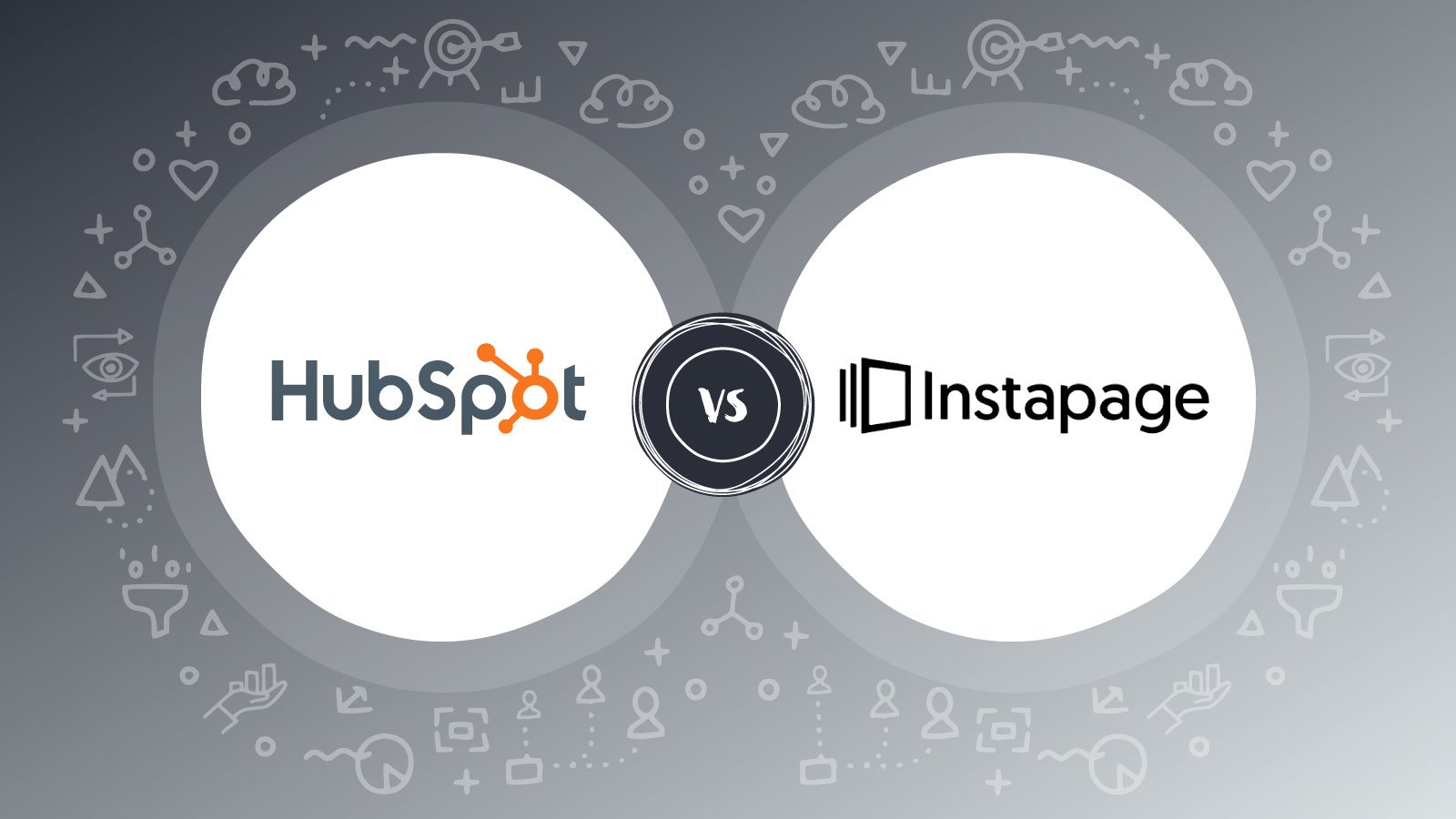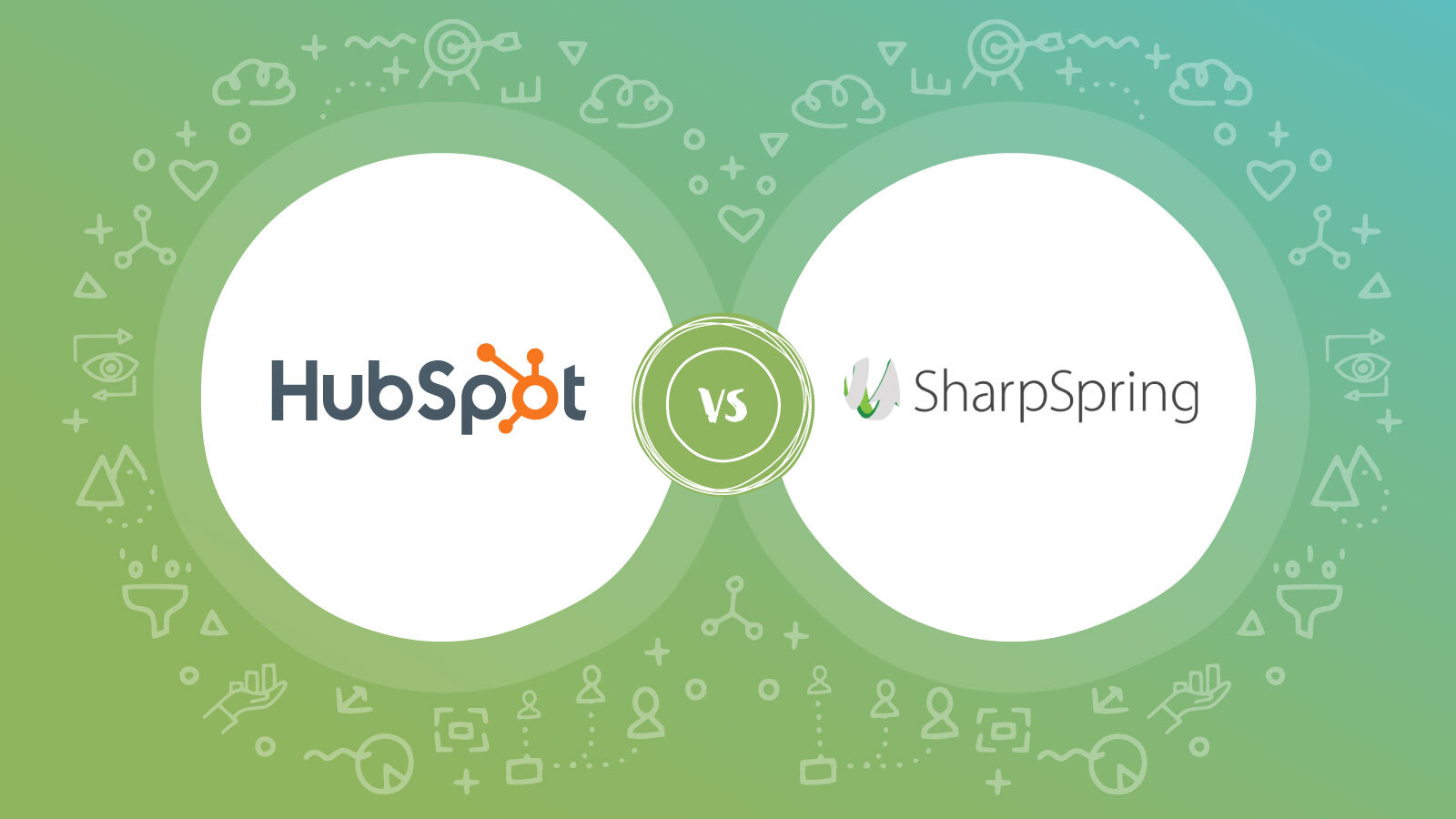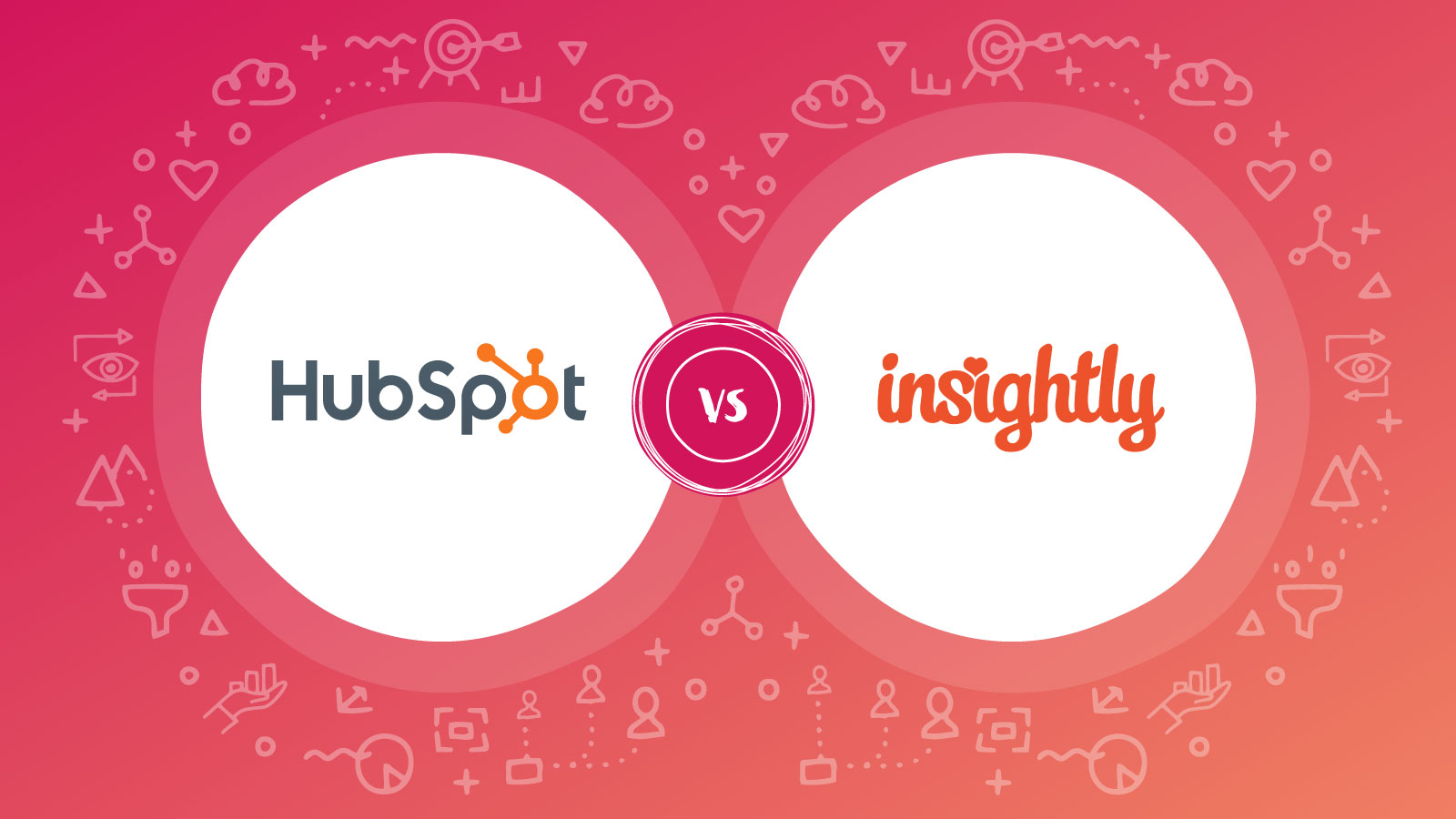Marketing automation is the practice of using software to automate critical marketing activities, including repetitive tasks such as email marketing, social media posting, and ad campaigns.
This not only improves efficiency, but it also aids in offering a more personalised experience for customers.
Most forward-thinking businesses use some form of marketing automation these days - in fact, recent studies show that around 51% of businesses currently use automation technology to optimise marketing processes, with more than half of B2B companies (58%) planning to adopt the technology in the near future. According to Gartner’s latest annual CMO Spend Survey, 68% of CMOs expected their future MarTech budget to increase considerably.
Marketing automation might not be a new trend, but it is certainly a growing one. All of these stats point to one thing – if you're not already using marketing automation software today, you probably need to reconsider.
Despite the fundamental urgency to adopt marketing automation software in your organisation, it can be a complicated endeavour to choose a solution that fits your business requirements. There are many solutions on offer, all with different features, pros and cons, and you’ll need to make an educated decision - one which this blog will guide you in making.
What is the ideal marketing automation solution?
A growing misconception that marketing automation software is a cure-all solution for marketing growth, including generating new leads, has led many businesses to adopt sophisticated tools to automate the middle of their funnel, leaving them with no solution for generating new leads to nurture in the first place.
This has resulted in marketers buying email lists to nurture instead of generating their own inbound leads – a much more sustainable approach that creates the foundation for a healthy, long-term relationship with your customers.
This brings us to the ideal marketing automation solution - one that combines automation and strategy that enables you to nurture prospects with highly personalised content that engages, delights and converts prospects to clients.
Two marketing automation solutions offer features that support lead generation are HubSpot and Pardot. Read on to find out what they’re all about.
What does HubSpot offer?
HubSpot’s Marketing Hub is a Marketing Automation Software that enables users to create and deliver CRM-powered marketing. The powerful suite of tools is deeply integrated with your customer data and offers everything you need to create automated inbound marketing campaigns that consistently grow your business. Attract attention, convert more leads and report on your entire funnel from one central place.
What does Pardot offer?
Salesforce is a cloud-based customer relationship management (CRM) platform with applications for sales, service, marketing and more that help bring customers and companies together. Pardot is a marketing automation solution that was developed as a stand-alone platform in 2007 and subsequently purchased by Salesforce.
HubSpot vs Pardot – Which is better?
On your search for the ideal marketing automation solution for your business, it’s important to compare options to find the best fit. When stacked up against each other, both HubSpot and Pardot offer a wide variety of awesome features, however, there are some notable differences that will help you make a sound decision.
Let’s jump in and see how they compare across some of the most crucial marketing automation capabilities.
Functionality and Features
HubSpot’s Marketing Hub has an integrated set of tools designed to nurture prospects along the complete buyers’ journey. This includes website hosting, ads, landing pages, blogging, email, ABM, social, workflows, automation and attribution reporting. You will be hard-pressed to find a more feature-rich inbound marketing automation solution on the market.
With HubSpot, revenue and contact attribution reporting help your team track their performance at every stage of the sales process, from demand generation to closed deals. Attribution reporting makes it easier to make smarter, data-based decisions when allocating your budget by helping you identify the best-performing channels, and which ones might need more attention.
Marketing Hub is also the only marketing automation platform that offers top of funnel marketing automation tools, built inside of a world-class CRM. This unique combination is the most powerful way to deliver CRM-Powered Marketing to help you attract, engage, convert and delight the right customers through personalised content delivered through the right channels.
G2 reviewers felt that Marketing Hub meets the needs of their business better than Pardot. Furthermore, for feature updates and roadmaps, reviewers preferred the direction of Marketing Hub over Pardot.
Pardot also supports lead generation with a host of tools, including landing pages, forms, search tools, email, social connectors, workflow and A/B testing. Their main focus, however, remains on email automation, where they offer a visual nurturing canvas with integrated testing and reporting, scheduled email sending, and autoresponders for forms and landing pages. Although these features are extremely valuable, users may find they need to connect more tools as they scale.
Furthermore, Pardot landing pages are typically hosted on a subdomain or other third party domain separate from your main website, which makes domain tracking inconvenient and is considered bad practice for website SEO, where it is ideal to have all of your content on the same domain.
One G2 reviewer writes “While Pardot does offer a landing page tool, it doesn't have any SEO tools built-in. It also lacks lead conversion assets like calls-to-action (they expect you to add tracking links to images and use them as pseudo-CTAs), and requires a separate tool (or manual labor) to track and analyse the effectiveness of top-of-the-funnel activities such as blogging."
Pardot allows you to track keywords, but doesn't integrate these efforts into any native content tools or competitive data. Other tracking still requires multiple tools such as the Google connector to monitor visits to your site. For landing pages it also can't tell you what sources are leading people to these pages and which ones are performing best and worst.”
In terms of reporting and analytics, Pardot users may find they need to adopt paid add-ons from Salesforce to provide adequate reporting functionality.
User Experience
HubSpot is known for its ease of use and intuitive user interface, making it one of the simplest solutions on which to get up and running in a flash. G2 reviewers, when assessing both solutions, found Marketing Hub easier to use, set up, and administer than Pardot.
HubSpot’s Marketing Automation, CRM Sales, & Service suites have all been built in-house, resulting in a unified and consistent user experience where customer data, reporting, and individual tools are all similar and work in concert with each other. This means a faster time to value for your employees, and faster time to market for your business.
Salesforce acquired Pardot in 2013, their 14th software sector transaction to build out their platform of products. As such, using any of the Salesforce platform of products, including Pardot, requires manual connections and maintenance to create a unified user experience, resulting in added technical complexity. Many companies will find that they will need to hire experienced and well-trained administrators to implement and maintain Pardot software, at a fairly hefty cost. According to Glassdoor, the average Salesforce administrator salary is US$97,413 per year.
One G2 reviewer said of Pardot’s usability: “It seems like Pardot is not being invested in. Using the tool is frustrating and slow.”
Customisation and Integration
In line with HubSpot’s dedication to ease of use, admins, reps, and managers have the freedom to organise and administer their CRM without the need to hire a dedicated admin or spend months on custom development work. For more sophisticated customisations, HubSpot offers custom objects, where you have the flexibility to name objects, determine what properties they have, and decide what other objects they can be associated with. This enables HubSpot users to architect their CRM according to their business needs and seamlessly import crucial third party data into the CRM. All of HubSpot’s products have been built in-house from the ground up, coupled with a thriving ecosystem of integrations and a flexible data structure that enables you to stay agile as you scale. With everything powered by the same database, all Hubs, tools and integrations connect seamlessly, which means that all of your teams and departments are working off the same system of record.
Pardot redeems itself in terms of its endless customisation options that are ideal for the most complex organisations. Again, however, the technical complexity of implementing such customisations may require more admin and developer support, which can make it difficult for businesses to change and adapt their Pardot instance over time. Existing Salesforce customers with adequate resources in place will, however, find the Salesforce integration a great asset to their business. One G2 reviewer comments: “Pardot has a great integration with SalesForce which allows for better analytics tracking and creating better qualified leads.”
Customer Support
Customer service is one area where HubSpot really shines. HubSpot consistently goes the extra mile to provide world-class customer support and self-help resources, including HubSpot Academy - ranked one of the top online learning platforms in the world. When comparing the quality of ongoing product support, G2 reviewers felt that HubSpot’s Marketing Hub is the preferred option.
Despite Salesforce’s revered reputation in the CRM space, Pardot’s customer support has been rated as poor across a number of review sites. Additionally, Pardot charges 20% of your net contract price for 24/7 premier support, while additional feature access costs 30% of your net contract price. As we’ve learnt, product and feature support is a necessity for Pardot implementation and maintenance, unless you have your own in-house technical support team. Customers will have to consider these costs, which will also increase as their business grows.
Pricing
Below is a breakdown of the total cost of ownership for the standard subscriptions of each tool.
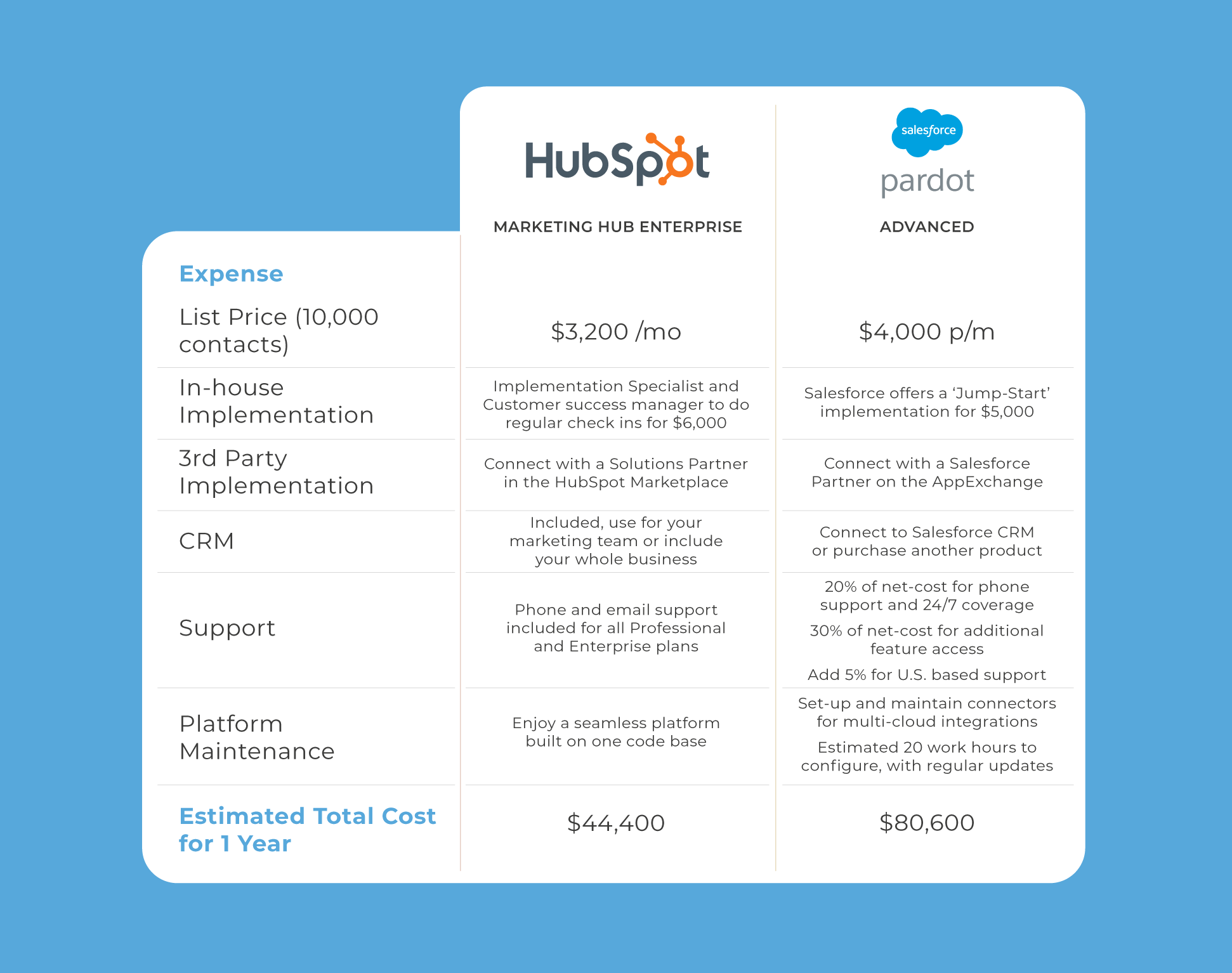
Ready to make a decision?
HubSpot is the clear frontrunner, despite Pardot’s Salesforce integration capability. When assessing the two solutions, G2 reviewers found Marketing Hub easier to use, set up, and administer, and they also preferred doing business with Marketing Hub overall. Reviewers further felt that Marketing Hub meets the needs of their business better than Pardot, and when comparing quality of ongoing product support, reviewers felt that Marketing Hub is the preferred option. Finally, for feature updates and roadmaps, reviewers also preferred the direction of Marketing Hub over Pardot.
G2 Reviewers rated HubSpot vs Pardot as follows:
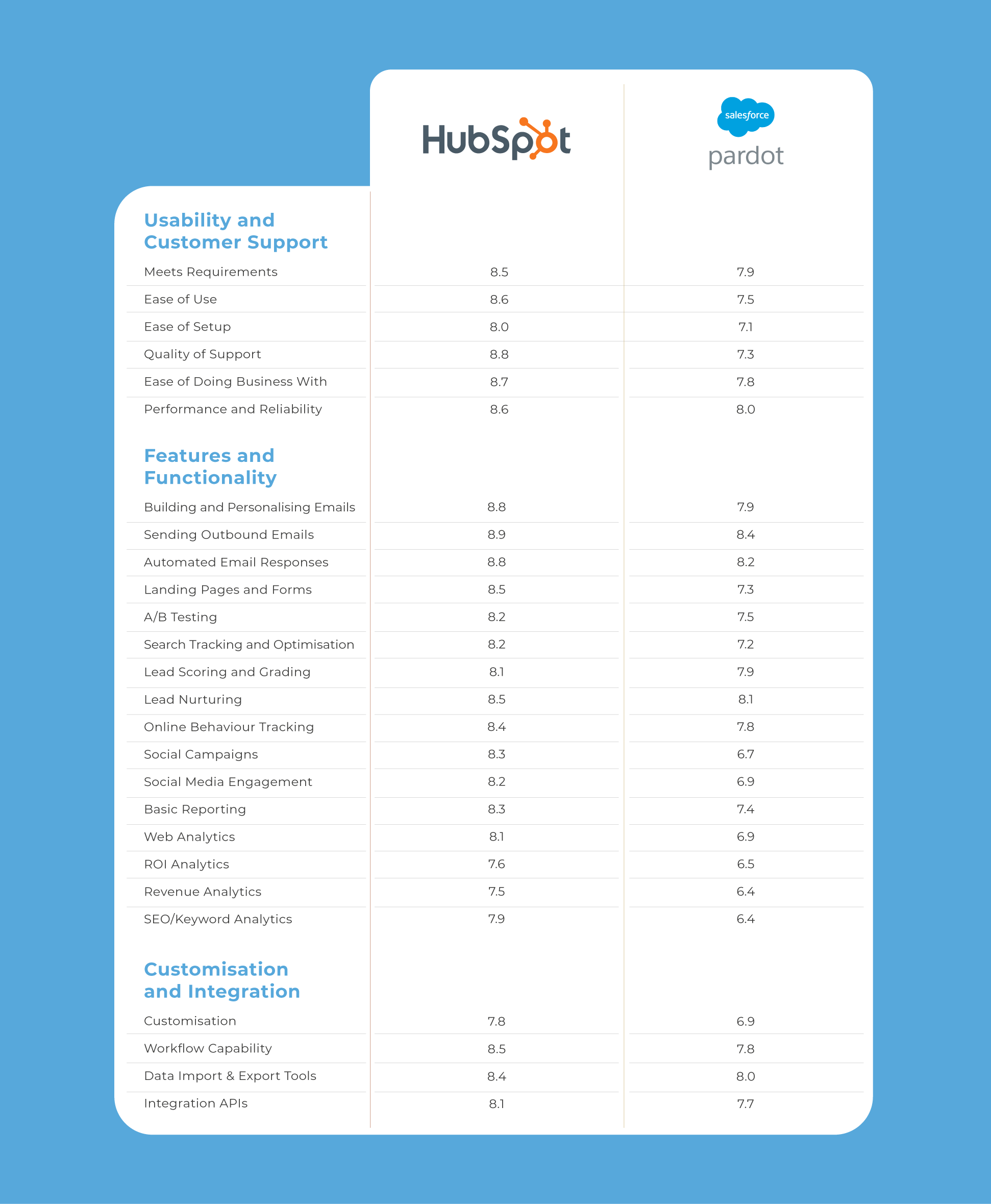
As you can see, HubSpot is a firm favourite in terms of user experience, features and functionality, customisation and integration, customer support and price. Unless you have existing Salesforce software that you wish to extend, HubSpot is the ideal marketing automation solution for enterprises of all sizes.
Explore our guide on how to choose the right CRM for your business.
Looking for more guidance on your marketing? Our team is here to help, so contact us today!

